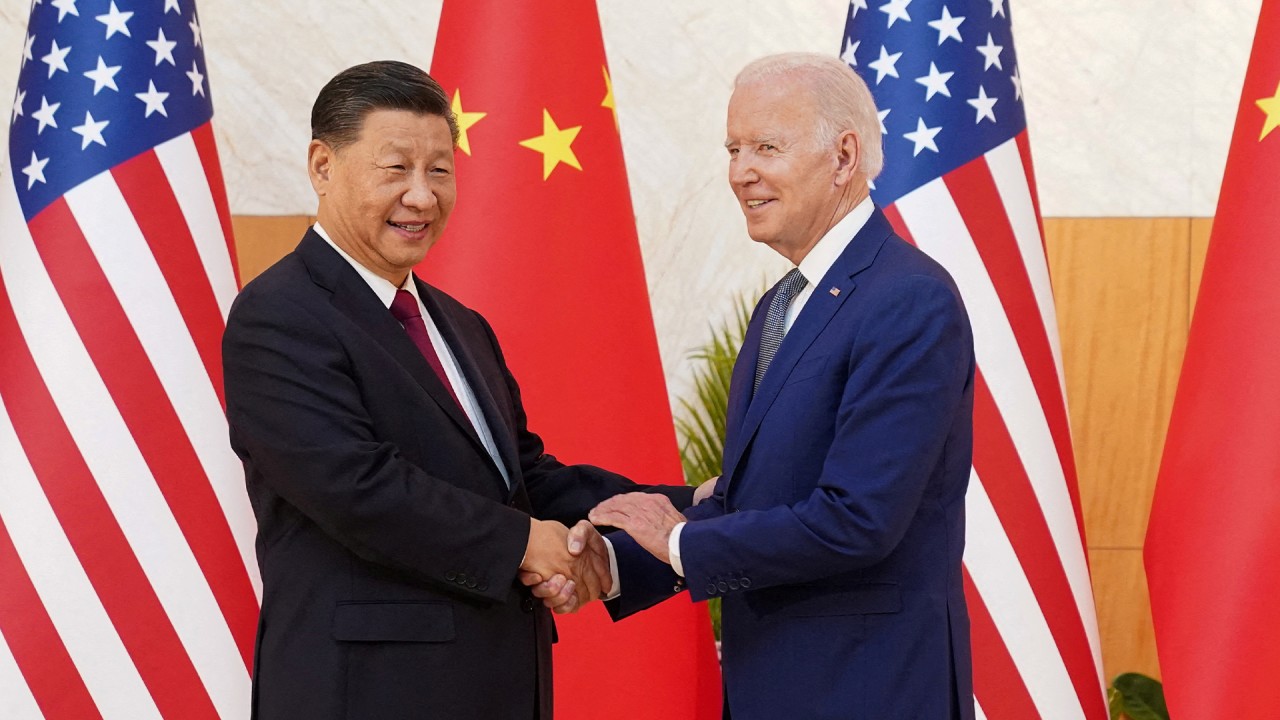
New US-China economic exchanges show how status quo trumps substantive changes in ties, analysts say
- President Joe Biden seen trying to avoid ‘undue escalation’ with China, while Donald Trump hails friendship with President Xi Jinping amid threats of higher tariffs on Chinese goods
- US-China Economic Working Group’s latest meeting comes as both sides struggle to see eye to eye on economic affairs in their ‘strategic rivalry’
Washington and Beijing appear keen on staying the course in their interactions, with warm handshakes and sincerity in dialogues, but they lack the incentive to resolve deep-seated differences, according to analysts who point to a just-concluded meeting of the US-China Economic Working Group.
Employing such a tactic in a formal economic-dialogue structure, they say, serves the respective agendas in both countries and comes as the administration of US President Joe Biden is facing a resurgent challenge by predecessor Donald Trump in an election year, while President Xi Jinping has his hands full trying to revive China’s economy.
“2024 is a year when both powers have incentives and strong reasons to favour the preservation of the status quo – strategic rivalry with rigorously installed guardrails to prevent the two parties from drifting towards undue escalation,” said Brian Wong, a fellow with the University of Hong Kong’s Centre on Contemporary China and the World.
And Shi Yinhong, an international relations professor at Renmin University, said there are no reasons to expect any “remarkable results” at such meetings, given past experiences.
The third gathering of the working group took place on Monday and Tuesday. It was the first time it had assembled in China. The next such meeting is set to take place in April.
“Issues that both sides emphasised have been discussed many times,” Shi added. “Financial and economic issues involve a lot of complicated details, and it’s not easy for either side to get hold of all the information of each other.”
Both sides this week discussed bilateral economic concerns, including tariffs, sanctions and investment restrictions. Other topics involved cooperation within the Group of 20, industrial policies and debt issues of low-income and emerging economies.
As long as the US is determined to oppose China, the US will find other reasons
During his virtual meeting with US trade official Marisa Lago on Tuesday, Chinese vice-minister of commerce Wang Shouwen also raised concerns over US restrictions on semiconductors and cloud services, as well as photovoltaic containments, and he demanded fair treatment for Chinese companies in America.
But despite a mutual desire to maintain strong bilateral communications, they struggle to see eye to eye on economic matters, according to Frank Tsai, an adjunct professor at the Emlyon Business School in Shanghai.
“The US has been criticising China’s model of industrial policy for more than a decade … What was once more of a US effort to align China with global practices has come to be perceived by China as justification for a larger goal of isolating China,” Tsai said. “By this logic, there is little incentive to compromise, since this won’t address the root cause.
“As long as the US is determined to oppose China, the US will find other reasons.”
The world’s two largest economies remain embroiled in a series of economic concerns – including what’s been called a “small yard, high fence” strategy of investment restrictions, a “de-risking” push, and reshoring or friendshoring via Mexico and Vietnam – while protectionist tariffs have been in place since the US-China trade war ignited in 2018.
“We may see some real progress in the months ahead if the politics break the right way,” he added.
But Barry also noted “it’s unlikely the Biden administration will do anything by way of concessions that would leave him vulnerable to attacks that he’s weak on China” during the election year.
Following this week’s working-group meeting, a readout from the US Treasury Department said US delegates also raised concerns about China’s industrial policy practices and overcapacity, as well as the resulting impact on American workers and firms.
US Treasury Secretary Janet Yellen was also looking forward to another China trip “at the appropriate time”, the statement said.
In a note by Goldman Sachs on Friday, Chinese investors were said to be concerned about the possibility of the US further increasing trade barriers targeting Chinese exports, especially if Trump were to retake the presidency.
While saying President Xi was “a very good friend of mine”, Trump threatened to increase tariffs on Chinese products by more than 60 per cent if re-elected, in an interview with Fox News on Sunday.
Some analysts say high import tariffs on Chinese goods have been a key source of inflation, with retailers passing on additional costs to American consumers.
Lu Xiang, who specialises in US-China relations at the Chinese Academy of Social Sciences, noted that prolonged inflation in the US has led many Americans to be disappointed with the Biden administration.
“It’s hard for the US to ‘decouple’ with the huge Chinese market and its supply capacity,” he added. “All the restrictions that the American government are imposing on China are zero-sum games, and it may be difficult to continue.”


